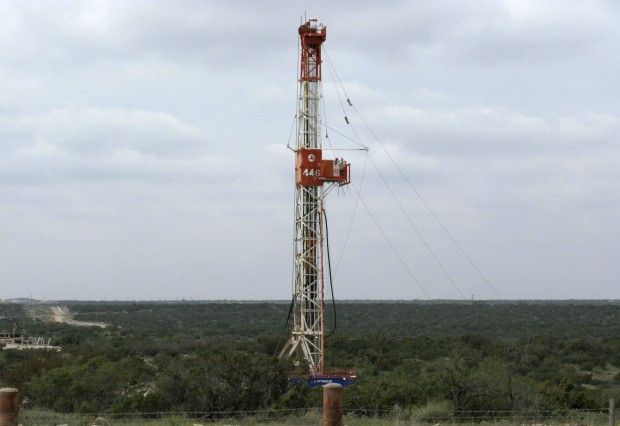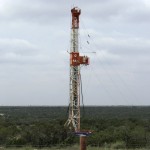What a Ban on Fracking in Denton Could Mean For the Rest of Texas

Terry Wade / Reuters /STRINGER /LANDOV
A rig contracted by Apache Corp drills a horizontal well in a search for oil and natural gas in the Wolfcamp shale located in the Permian Basin in West Texas. A successful petition in Denton could bring fracking bans to communities around the state.
Come elections in November, the city of Denton could be split between two very different futures.
The Denton Drilling Awareness Group (DAG) recently got enough signatures on a petition to place an ordinance banning fracking within city limits on local ballots. Though other communities in Texas have passed restrictions on fracking, a moratorium on drilling activity within Denton could spur the rise of similar legislation across the state.
If the ban passes it will likely provoke a precedent-setting legal battle that would help clarify the authority of local governments over oil and gas operations in Texas.
Why ban fracking in the first place?
The DAG petition against hydraulic fracking, the drilling method of using water, sand and chemical injections to extract oil and gas from shale formations, cites that fracking operations “impact the City’s environment, infrastructure and related public health, welfare and safety matters.” Aside from concerns over groundwater contamination, noise pollution and air quality, drilling disposal wells that store waste from fracking have also been heavily linked with low-magnitude earthquakes.
But, according to the group, an all-out ban was a last solution in a long, unsuccessful effort to restrict hydraulic fracking through less extreme means. There are over a dozen wells within city limits, and a previous ordinance failed to prevent drilling activity near neighborhoods and residential areas.“We saw, once the [original] ordinance was passed, the sort of futility of this compatibility strategy,” Adam Briggle, the vice president of DAG said. “The realization was that you can either have fracking or you can have a healthy city, but you can’t have both.”
Mark Burroughs, the mayor of Denton, supports restrictions on fracking but thinks that the moratorium goes too far, and worse, might be illegal.
“If it does pass, the city has to follow it,” Burroughs says. “We could be bound to enforce an illegal act, which throws into a whole panoply of open issues…. We as a city would be bound to defend it, whether we believed it was illegal or not. So it’s a real open, difficult series of issues.”
Can Texas cities even ban fracking?
In Texas, the Railroad Commission issues drilling permits for oil and gas companies. Local municipalities have very little say in where these permits are granted and how they’re handled. But cities and communities aren’t entirely helpless, either.
Aside from being able to place restrictions on things like when and where drilling activities can happen, communities can enact ordinances to protect the health, safety and welfare of their citizens.
“I think cities throughout Texas are looking at the fact that while an individually fracked well might not be that big of a deal, when you talk about lots and lots of wells and lots and lots of oil and gas facilities being located where people live, play and work, that does become an issue,” Cyrus Reed, conservation director of the Lonestar chapter of the Sierra Club, says.
Reed says negative health impacts don’t just come from fracking, but also the activities associated with fracking like increased truck traffic.
But it’s unclear if a complete ban falls under the health, safety and welfare clause.
Since the rise of fracking almost a decade ago, restrictions like the proposed ordinance in Denton have popped up in states like New York, Pennsylvania and Colorado. Courts have tended to side with municipalities, David Spence, a professor of law, politics and regulation at the University of Texas, says.
But since a full moratorium hasn’t been enacted and then challenged in Texas before, he isn’t sure what will happen.
“This issue may be enough of a hot-button issue that courts are going to really work hard to try to find a way to be able to uphold local ordinances, and at least we’ve seen a little bit of that in the northeast,” he says.
According to state law, every Texas city must obey the state’s constitution and statutory requirements. “Home rule” cities like Denton, are given a bit more autonomy and legal flexibility may be legally able to adopt a fracking moratorium.
And if the ban passes?
Almost without a doubt, if the proposed ban passes in November, it will draw legal challenges. Around the country, oil and gas companies have filed suits against fracking bans, and the state of Texas itself could get involved if it believes Denton oversteps its authority.
Lawsuits may be filed on two claims: developers or landowners may make the argument that the state rules trump local laws. Landowners can also claim their mineral rights were taken without compensation, a federal constitutional claim called regulatory takings.
“These two types of litigation are about to become much more common,” Spence says. “There are hundreds and hundreds of municipalities nationwide who have passed anti-fracking ordinances recently, so these kinds of cases are going to be bubbling up through the courts a lot in the near future.”
Though no fracking restrictions have been challenged in Texas so far, Briggle is encouraged by rulings on local regulations against the oil and gas industry.
“You can see that municipalities have a winning track record when it comes to case law history against the oil and gas industries in Texas, and I think we’ve written a smart ordinance here,” he says, “But you’ll never know until it goes through a court system.”
Reed believes that a successful ban in Denton could lead to similar bans in other cities. He says it shows “political will and some momentum that people really want better regulations, better enforcement, better inspections of fracking activity.”
Briggle, however, says that the group of Denton citizens isn’t necessarily interested in seeing similar bans enacted; it only wants what is best for Denton.
“The trend that I hope catches on is local self-determination … now whether that means folks want to ban fracking everywhere, I don’t know,” he says. “To me, the more important thing is that communities are able to determine that for themselves.”



